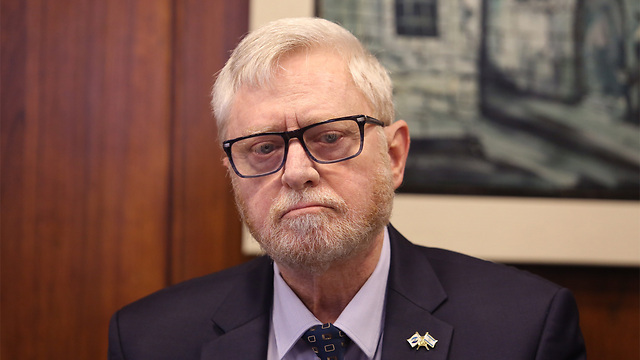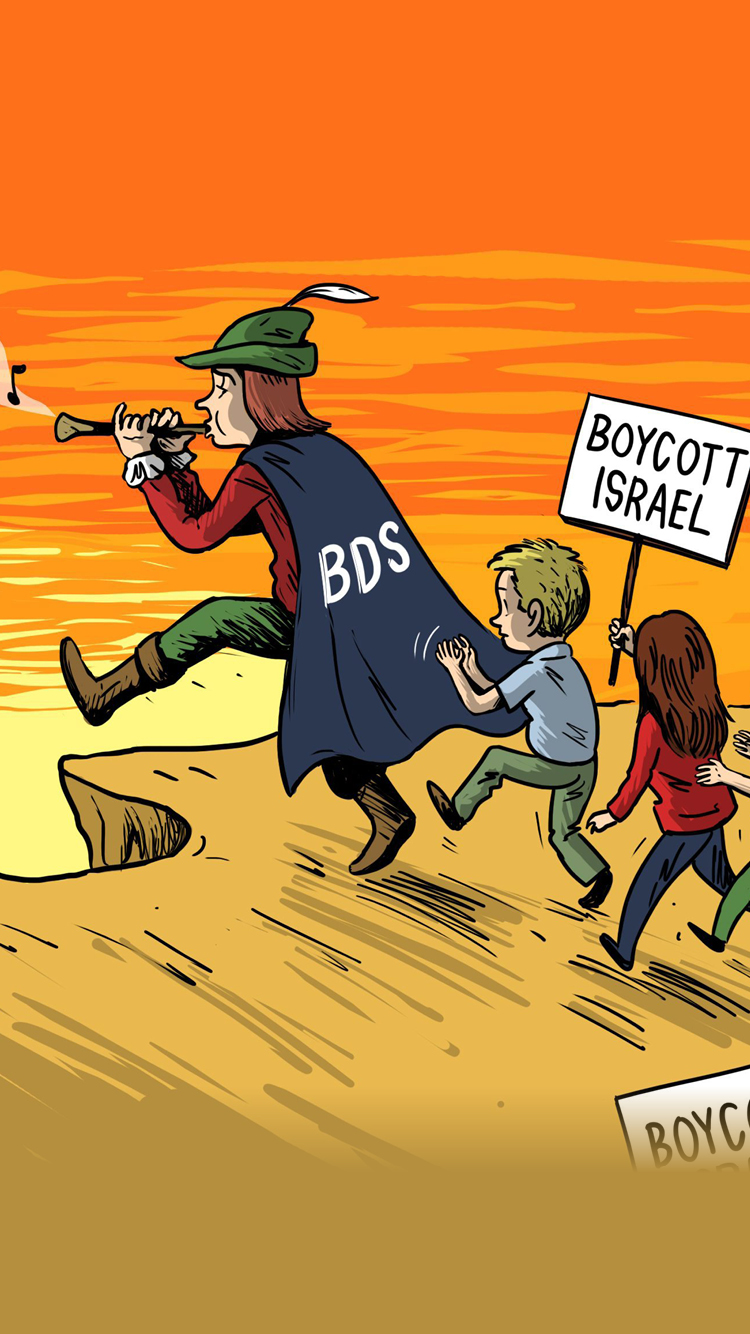The state comptroller’s report, published Tuesday, underscores the government’s failings in combating the international movement as well as rising anti-Semitism; among other criticisms, the report mentions power struggles between ministries, a lack of coordinated efforts, understaffed departments aimed at combating the boycotts and difficulties in presenting any notable accomplishments
State Comptroller Judge Yosef Shapira’s recent report, issued Tuesday, has no qualms in outlining the government’s failure to successfully respond to the BDS movement. It begins by describing the movement behind “actions of certain international, anti-Israeli organizations have been aimed to delegitimize Israel, both on an ethical and political level, in different countries throughout the world, by presenting Israel as a singular Apartheid state and cause real damage to Israel through academic, cultural, financial and commercial boycotts.”
“This phenomenon has not been missed by decision makers in the political echelon,” states the report. “And yet as late as the end of 2015 there was still confusion as to what authorities and resources fall within the jurisdiction of the Foreign Affairs Ministry as opposed to the Strategic Affairs Ministry regarding a response to the BDS movement, while agreements that were previously reached between the two ministries in 2012 were never actualized.”

Despite the Security Cabinet’s decision in October 2015 that granted the of Strategic Affairs Ministry (headed at the time by Gilad Erdan from the Likud) the authority to assemble and manage the state’s fight against boycotts, the state comptroller’s report stated that the ministry lacks certain operational advantages that the Foreign Affairs Ministry has, including over 100 delegates stationed throughout the world who already have a deep understanding of local dynamics—a necessity when putting out an efficient response to the BDS. In addition, it is likely that Foreign Affairs Ministry delegates have established connections to local allies in their fight against the BDS, including associate organizations sympathetic toward Israel.
Despite the Strategic Affairs ministry being awarded a wide range of authorities to head the government’s battle against forces looking to delegitimize Israel and against any boycotting initiatives in 2013, the ministry did not manage to use the entire budget it was given for these tasks, and it didn’t achieve significant accomplishments in this field. It also failed to actualize its work plans in 2015.
The division within the Foreign Affairs Ministry entrusted with fighting the boycotts, which only has two positions, has yet to formalize clear measures by which to assess the ministry’s goals regarding boycotts. For this reason, the ministry found it difficult to present any achievements in its battle to thwart efforts to delegitimize Israel on an academic level, cultural level, through professional unions and within public opinion in various countries. In fact, the state comptroller’s report stated that according to the information provided by the ministry’s international representatives, these problems have only been growing.
The report went on to say that it appears that despite the threat of boycotts becoming greater and greater, the Foreign Affairs and Strategic Planning Ministries have been busy quarreling with each other over various authorities, in lieu of cooperating toward their shared goal.
Back in 2010, The Strategic Affairs Ministry recommended that then-Prime Minister Benjamin Netanyahu approve the erection of a an official division within the Prime Minister’s Office tasked with the research and strategic development needed for establishing government policy vis–à–vis its struggle against attempts to delegitimize Israel. In August 2011, then-Foreign Affairs Minister Avigdor Lieberman voiced his objection to this recommendation. The division was never set up.
The Strategic Affairs Office Director-General had then initiated the founding of a volunteer network that would unite a list of Jewish organizations in a joint effort to fight the BDS movement. The initiative was faced with the objections of the Foreign Affairs Ministry Director-General, who opposed the Prime Minister’s Office creating new positions and allocating budgets to the Strategic Affairs Ministry for the management of such a network. “Any attempt to build a coalition with our natural allies abroad is not only inappropriate under the very definition of the Strategic Affairs Ministry’s duties, it is a wasteful and borderline ludicrous act,” he said.
In January 2012, the Foreign Affairs Ministry director-general had written the head of the National Security Council in response to his decision regarding the division of responsibilities between the two ministries, saying that what should be done is strengthen the relevant experts within the existing systems dealing with this issue, “instead of creating parallel and double divisions, whose involvement in the matter creates more disadvantages than advantages.” According to the director-general, creating such divisions would cause “a confusing duality that would hinder the work that is being done instead of promoting it, while weakening our delegates and weighing down on our missions.”
Three months later the two director-generals came to an agreement as to how to divide the different authorities and responsibilities between the two ministries, but the agreement was never actualized.
The report goes on to say that the Strategic Affairs Ministry did not receive the necessary services pertaining to attaining its objectives, such as legal council, accounting, acquisition or human resources management.It had to rely on the Prime Minister’s Office to provide them. This continued even after October 2015, when the Security Council commissioned the Strategic Planning Ministry with the task of “leading the campaign against the delegitimizing of Israel and boycotting both outright and covertly.” According to the state comptroller, the Cabinet’s decision did little to provide a solution to the lack of general and managerial staff needed to promote the relevant strategic and diplomatic objectives. The Strategic Affairs and Foreign Affairs Ministries continued to quibble with each other following the PMO’s decree.

Despite the fact that higher education institutes continue to make up the majority of the BDS movement’s area of operation, the Foreign Affairs Ministry’s division charged with communications and hasbara has not executed any detailed plan regarding the fight against delegitimizing Israel across campuses in North America and Britain.
The comptroller’s report went on to say that despite the various delegates’ involvement in heading off the BDS movement, involvement that mainly included monitoring boycott initiatives promoted by non-governmental organizations, apart from a single emissary that the Foreign Affairs Ministry had sent to the Israeli Embassy in London, there were no delegates sent with the explicit purpose of combating the BDS movement as of the summer of 2015. The importance of sending such delegates was made clear when the Israeli Embassy in The Hague wrote the Foreign Affairs Ministry in August 2014, saying that one of its two positions dealing with public affairs had yet to be filled. At the same time, anti-Israel activities in the Netherlands had resulted in “more than 50,000 Dutch people downloading an application to their phones that promotes consumer boycotting initiatives.
The Foreign Affairs Ministry has explained that while it aims to assign more delegates to the fight against the BDS movement, it has recently been dealing with “manpower and budget cuts,” and that it has been finding it increasingly difficult to recruit more cadets.
The state comptroller’s report also mentioned the government’s failure to combat anti-Semitism abroad alongside and perhaps in relation to the growing BDS movement. The Diaspora Affairs and Foreign Affairs Ministries both deal with this issue, but according the report, the two have not cooperated with one another on the matter.
Foreign Affairs Ministry failed to intercept hostility
The comptroller’s report stated that the Foreign affairs Ministry has been unsuccessful in managing its hasbara campaign, and that it has not been able to stave off the overt hostility aimed at Israel by certain groups abroad. As a result, the messages promoted by the BDS movement have managed to convince sectors of the population that used to unequivocally defend Israel.
According to the report, a great deal of anti-Israeli sentiment has been found in many countries, and particularly in Europe and Muslim countries. In Germany for instance, 60 percent of those polled expressed criticism toward Israel, while only 30 percent expressed any sympathy. Sweden was similarly found to have a 68 percent criticism rate, but Turkey was even higher, where 86 percent expressed anti-Israel sentiment.
The situation was found to be somewhat better in the United States, yet even there an erosion has been spotted, as the more liberal sect in the Democratic Party was found to be wavering in its support of Israel, and while the country’s overall statistics have gone from 70 percent support in 2009 to 59 percent at present.
The IDF Spokesperson’s Unit is out of sync with the Foreign Affairs Ministry
As things continue to progress regarding the BDS movement, the IDF Spokesperson’s Unit has issued a statement of its own, criticizing the Foreign Affairs Ministry and officials in the Prime Minister’s Office in charge of hasbara for “waiting to be debriefed while failing to contribute information themselves,” saying that it was “impossible to receive a clear picture as to the actions it has carried out both domestically and abroad” and that the ministry “did not seem to have any strategic plan in place.” It added that “there was no concrete request received from the Foreign Affairs Ministry to do anything substantially different in an effort to improve matters or offer support.” The IDF Spokesperson’s Unit concluded by saying that there is no official communications policy set by its office and the Foreign Affairs Ministry.
On top of criticism directed at government offices, the report also found that the IDF Spokesperosn’s Unit had dawdled in approving the distribution of visual material from the battle field, which had worked the BDS movement’s advantage.
The IDF Spokesperson’s Unit accepted this criticism, but claimed that waiting to approve the images “did not delay matters.”
The government, on its part, and specifically the Foreign Affairs Ministry, have conceded that more positions must be added for Arabic-speaking delegates to promote a dialogue with the Middle East’s Arabic-speaking community, but that the ministry has been finding it difficult to fill such positions, which substantially hinders its ability to communicate with Arabic-speaking domestic and foreign press
As reported by Ynetnews
